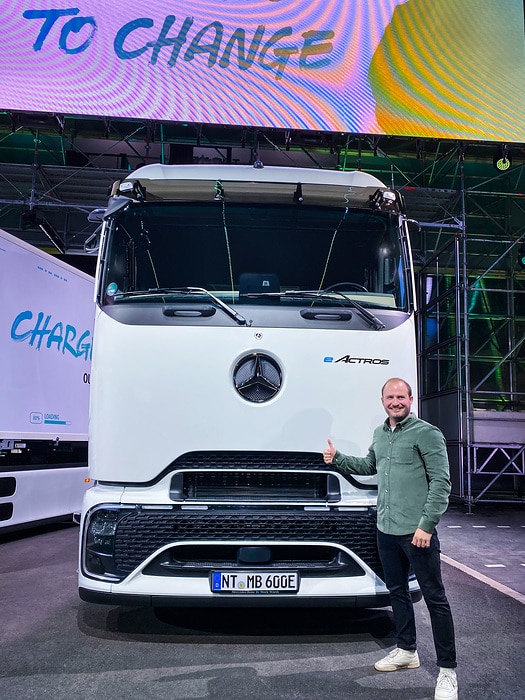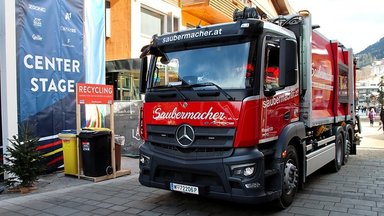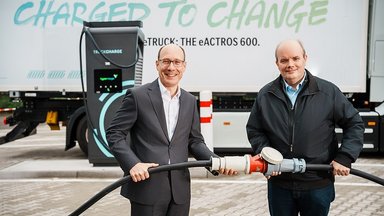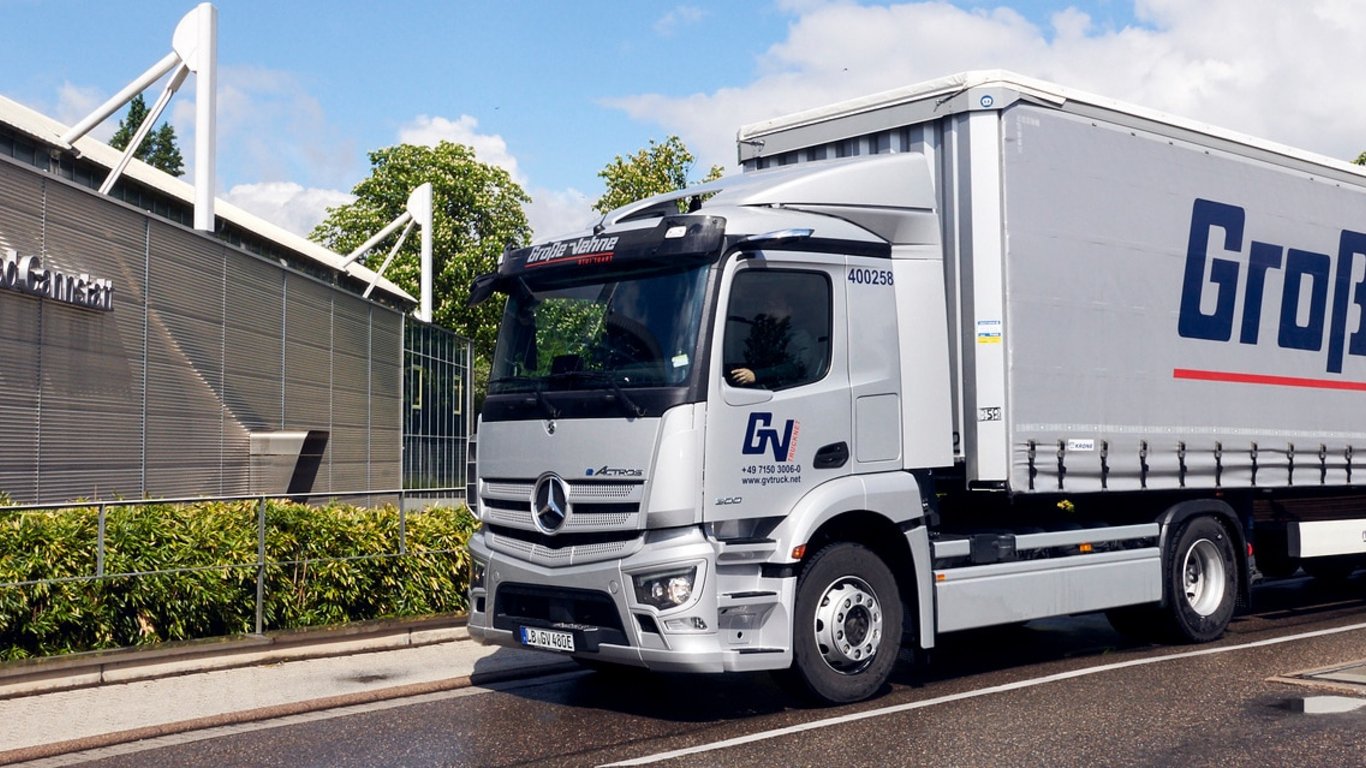
Mercedes-Benz Trucks customer Große-Vehne is actively pushing the drive transition forward
Download
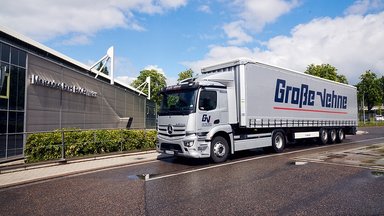
Mercedes-Benz Trucks customer Große-Vehne is actively pushing the drive transition forward
Logistics company Große-Vehne pioneers deployment of battery-electric trucks Electrification projects for plant logistics from Mercedes-Benz Trucks and Mercedes-Benz Group AG in preparation or successfully launched Große-Vehne’s clients increasingly interested in CO2-neutral logistics Demands on policymakers: Building-up of infrastructure and planning reliability Leinfelden-Echterdingen / Kornwestheim – What are the demands…
- Logistics company Große-Vehne pioneers deployment of battery-electric trucks
- Electrification projects for plant logistics from Mercedes-Benz Trucks and Mercedes-Benz Group AG in preparation or successfully launched
- Große-Vehne’s clients increasingly interested in CO2-neutral logistics
- Demands on policymakers: Building-up of infrastructure and planning reliability
Leinfelden-Echterdingen / Kornwestheim – What are the demands placed on a major fleet operator by the drive transition? What can already be implemented today and what is the significance of there no longer being ten or 100 trucks on the road but more than one thousand? The transition of a large truck fleet also takes place in stages. This is because even an operator of a large fleet wants to first gather experience before taking the next steps. This is exemplified by Große-Vehne. The corporate network GV Trucknet operates throughout Europe with some 1,200 own trucks, 90 percent being from Mercedes-Benz. The success of the transition depends on numerous conditions being fulfilled. Alongside a suitable range of vehicles, appropriate grid capacity and charging infrastructure are imperative. And last but not least, deployment of electric vehicles must be worthwhile, meaning that there must be cost parity with diesel trucks.
GV Trucknet is working hand in hand with Mercedes-Benz Trucks on all these aspects. In cooperation, the first routes for electric trucks have been established and further ones are being designed.
Christoph Forcher, eConsultant at Mercedes-Benz Trucks and, in this role, also responsible for Große-Vehne: “The conversion especially of large fleets to alternative drives is an exceedingly complex undertaking. We are very pleased that longstanding Mercedes-Benz Trucks customers, like Große-Vehne, are showing an interest in and are open to the new technologies. We identify our task as supporting them with the transformation from the very outset so that the successive transition to zero emission trucks will be a success story for them.”
René Große-Vehne, Managing Director of GV Management: “As a responsible provider of logistics services we are actively facing up to the drive transition and are ready to make our contribution to climate protection. From my perspective, it is essential to trial several alternative technologies – not only batteries but also hydrogen drives, for example. One characteristic of electromobility is that it not only depends on the right vehicle for the purpose but also on the charging infrastructure as well as energy generation and storage.”
eActros 300 Lowliner for electric delivery traffic
Two lowliner-variant eActros 300 will be deployed for the first time on the new round trips being planned. The Mercedes-Benz semitrailer tractors with battery electric drives are able to pull megatrailers with an internal height of three meters, which are in widespread use in automotive logistics. The eActros semitrailer tractors travel between GV Trucknet’s location in Kornwestheim near Stuttgart and the Mercedes-Benz truck plants in Wörth and Gaggenau. With its inbound logistics concept, Mercedes-Benz Trucks is planning to fully electrify the deliverytraffic to the Wörth plant by the end of 2026. In a next step, the planning involves also extending the procedure to the other German plants in the Mercedes-Benz Trucks production network, Kassel, Mannheim and Gaggenau. Logistics partners such as GV Trucknet play a central role in this development.
Deployment offers ideal utilization of resources: On the outward journey, the trucks carry vehicle components as production supplies, on the way back they transport empty load carriers. The distance traveled is around 100 kilometers, one way. As the eAcros 300, being a semitrailer tractor, is able to achieve a range of up to 220 kilometers[1] with one battery charge, the drivers do not have to take intermediate charging into consideration en route. This means they are able to exclusively use the charging stations of GV Trucknet and Mercedes-Benz Trucks at the starting point and at the destination. At the depot of GV Trucknet in Kornwestheim, drivers have the possibility to use a charging station with an output of 160 kW and in the world’s largest Mercedes-Benz Trucks production plant there is a whole charging park with charging stations of differing capacities.
eActros 300 semitrailer tractors on the road for Mercedes-Benz Group AG
For some time now, Große-Vehne Spedition has been using two regular eActros 300 semitrailer tractors for Mercedes-Benz Group AG, i.e. likewise for automotive logistics. The vehicles shuttle on a round trip between Bad Cannstatt engine plant and the Sindelfingen plant. The two battery-electric Mercedes-Benz e-trucks each travel around 180 kilometers on a daily basis and, until the planned charging infrastructure has been put in place, are charged at a truck stop. The electrification of this operation at Mercedes-Benz Group AG was the first consultation project with an industrial company implemented by Daimler Truck.
GV Trucknet has plans to add more electric trucks to the existing four. “We will supplement the fleet with further e-vehicles,” announces René Große-Vehne, adding that they are currently in discussions with other customers. “We have a very great interest in deploying electric and hydrogen mobility as well as alternative fuels and building up experience,” he explains. There is also correspondingly great interest in the eActros 600 for heavy-duty applications in long-distance haulage and in the hydrogen-powered GenH2 Truck from Mercedes-Benz, which will enter customer trials soon.
Customers are increasingly interested in environmentally friendly offerings
Große-Vehne sees growing interested in environmentally friendly logistics services on the part of his customers. One of the reasons: In many cases, transport companies have set themselves climate and environmental targets. Many of them are, or will be, subject to reporting obligations under the new Corporate Sustainability Reporting Directive (CSRD) rules and have to document the measures they intend to take to reduce their CO2 emissions. In this context, they are also paying greater attention to logistics.
The entire upper management at Große-Vehne strongly supports CO2 neutrality. According to the company, GV Trucknet has been, as one of the first major providers of logistics services, fully CO2 neutral since 2018. To compensate for the CO2 emissions that have been unavoidable to date, the corporate group will have planted a million trees already by the end of the year.
Demands on policymakers: Building-up of infrastructure and planning reliability
With regard to the investments, GV Trucknet was able to utilize grants from the German federal government’s KsNI subsidy program not only for all four electric trucks but also for the charging infrastructure in Kornwestheim. This makes their deployment more attractive also from an economic perspective. The rapid charging stations with 160 kW have an adequate output for current usage requirements. The existing conditions for depot charging infrastructure vary from site to site, however. This means that one approach that might be taken by transport companies is to build up electric fleets where the conditions are most favorable in terms of space and grid connections. Große-Vehne is also being open-minded with regard to photovoltaic installations on the roof with a view to keeping the vehicles moving with own-generated solar electricity. Here again, the prevailing conditions differ between locations.
Because GV Trucknet is setting a good example itself, René Große-Vehne has no doubt that CO2 neutrality will be a success also at a federal level. The federal government is aiming for this target by 2045. “Why should we not succeed in doing so,” says the hauler. “What alternative do we have?” He would, however, prefer a little more support for the transportation and logistics sector on the way to climate neutrality. One aspect would be the building up of a nationwide charging and filling infrastructure. “If we are promoting electrification, it will also be necessary to build up the infrastructure, otherwise it won’t work.”
After the abrupt end of the KsNI subsidy program, the sector furthermore needs greater predictability and planning reliability. The current situation is that zero emission trucks are exempted from CO2-based road tolls only until the end of 2025 –for Große-Vehne, too short a period to shoulder the great investments needed. And last but not least, the manager makes the case for standards in the drive transition.
“We need industrial standards.” He points out that standards have proven to be effective – specifically in the field of logistics, as demonstrated by the universal success of containers or pallets.
About Große-Vehne
GV Trucknet has more than 2,700 employees at 14 companies in nine locations; this figure includes more than 100 trainees. The corporate network has 1,200 own trucks in operation, 90 percent of which being from Mercedes-Benz. It focus areas include automotive logistics, depot and system traffic for the CEP sector, retail, beverage and textiles logistics services. The group’s operations cover a logistics area of some 110,000 square meters. GV Trucknet is celebrating its 50th anniversary this year – 1974 was the year the company put its first truck on the road.
New TruckCharge brand from Daimler Truck
Daimler Truck introduces the new TruckCharge brand in Europe. This name brings together all the company’s existing and future offerings relating to e-infrastructure and the charging of electric trucks, i.e. consulting, hardware and digital services. In this way, Daimler Truck intends to provide customers with a cost-efficient overall package, from energy generation through to vehicle operations, enabling them to exploit the full potential of electrification. TruckCharge is targeted not only at truck fleet operators but also at industrial companies with their own or an outsourced truck fleet. As vehicles of different OEMs are generally used, TruckCharge is available irrespective of the truck brand. Daimler Truck will officially launch TruckCharge at the IAA Transportation in Hanover in September.
[1] The range was determined in-house under optimal conditions, including with three battery packs after preconditioning in partially loaded distribution traffic with a semitrailer at 20 °C ambient temperature.
Article assets
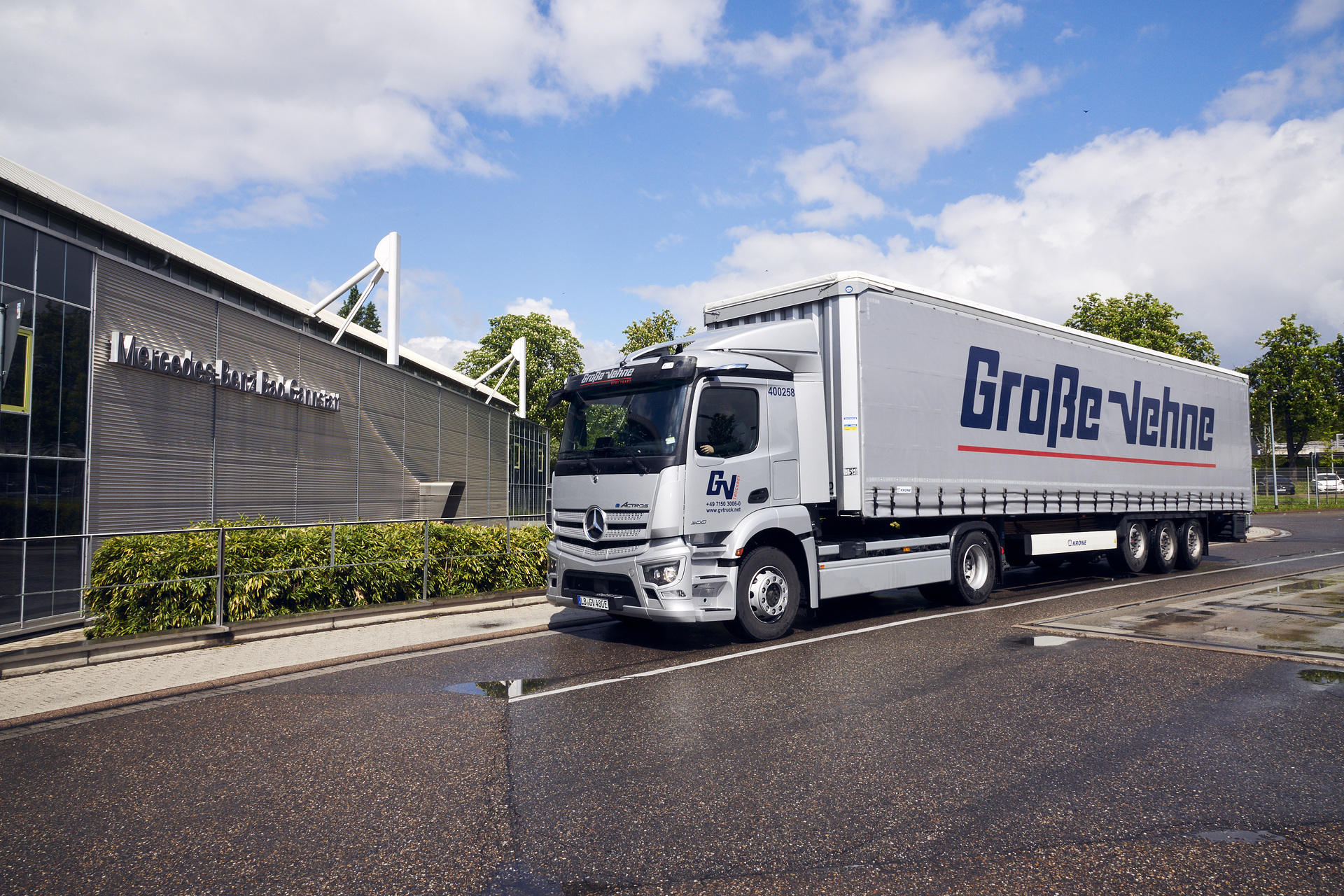
Mercedes-Benz Trucks customer Große-Vehne is actively pushing the drive transition forward

Mercedes-Benz Trucks customer Große-Vehne is actively pushing the drive transition forward

Mercedes-Benz Trucks customer Große-Vehne is actively pushing the drive transition forward

Mercedes-Benz Trucks customer Große-Vehne is actively pushing the drive transition forward

Mercedes-Benz Trucks customer Große-Vehne is actively pushing the drive transition forward

Mercedes-Benz Trucks customer Große-Vehne is actively pushing the drive transition forward

Mercedes-Benz Trucks customer Große-Vehne is actively pushing the drive transition forward

Carola Pfeifle
Spokesperson Product Communications Mercedes-Benz Trucks
carola.pfeifle@daimlertruck.com
+49 160 8612423

Peter Smodej
Head of Communications Product & Corporate Mercedes-Benz Trucks / Daimler Buses
peter.smodej@daimlertruck.com
+49 176 30936446


